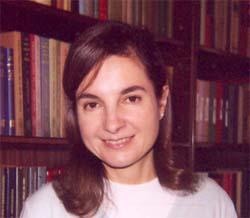
María José Albalá
Departamento de Lengua Española
Universidad Nacional de Educación a Distancia
website

Victoria Marrero
Departamento de Lengua Española
Universidad Nacional de Educación a Distancia
vmarrero@flog.uned.es
website

|
María José Albalá Departamento de Lengua Española Universidad Nacional de Educación a Distancia website |

|
Victoria Marrero Departamento de Lengua Española Universidad Nacional de Educación a Distancia vmarrero@flog.uned.es website |
| Participants: | 3 children -- ages 1;8 to 8 years old |
| Type of Study: | longitudinal |
| Location: | Spain |
| Media type: | wrote to Marrero |
| DOI: | doi:10.21415/T55P5D |
Cappelli, G.; Marrero-Aguiar, V. & Albalá, M.J.(1994). Aplicación del sistema MORFO a una muestra de lenguaje infantil. Procesamiento del Lenguaje Natural. 14, pp. 23 - 32.
Albalá, M.J.; Marrero-Aguiar, V. (2006). El desarrollo de las clases de palabras en la morfología infantil. In Filología y Lingüística. Estudios ofrecidos a Antonio Quilis. 1, pp. 379 - 398. Madrid, CSIC, 2006.
Marrero-Aguiar, V.; Aguirre Martínez, C. & Albalá Hernández, M.J. (2007). The Acquisition of Diminutives in Spanish: A Useful Device. In Savickiene, I. & Dressler, W. U. (eds), The Acquisition of Diminutives: A Cross-Linguistic Perspective. pp. 155 - 181. John Benjamins, Amsterdam.
These 12 files are the first part of a corpus on Spanish child language in CHAT format. The aim of our work is the linguistic analysis (at the phonic, morphologic, syntactic, semantic, and pragmatic levels) of the language of six normal children, from 1;8 to 8 years old. This longitudinal study started at the end of 1990. Transcription is orthographic, when it is possible. When the child form does not correspond to a standard word, but we can identify the unit, the transcription is as close as feasible to the orthographic representation.
Errors are not marked with [*] on the main line, but are coded on the %err dependent tier, with the following structure:
< locus > nonstandard word = standard word
Files beginning by IDA belong to a child living in the Canary Islands, where a specific dialect of Spanish is spoken (similar, in some aspects, to the Caribbean Spanish). The transcription was made, however, maintaining the orthographic rules of standard Spanish, but indications about the pronunciation of some sounds are attached.